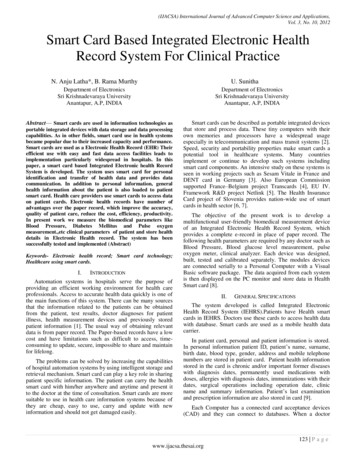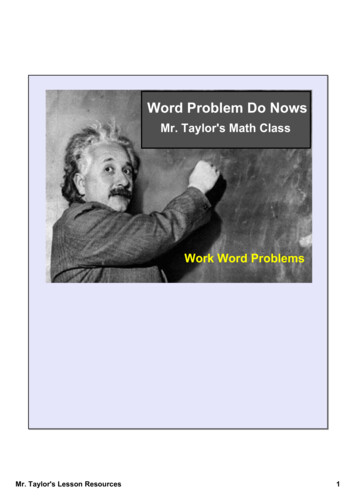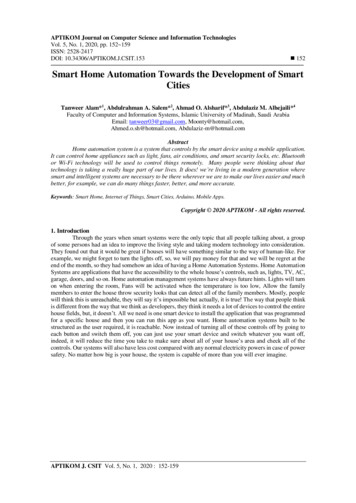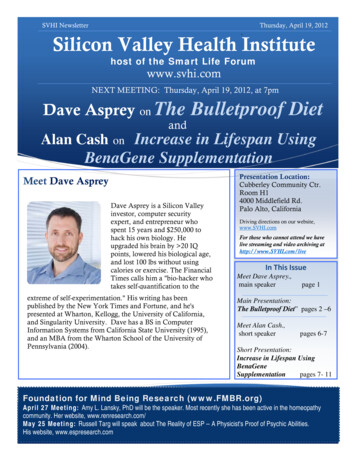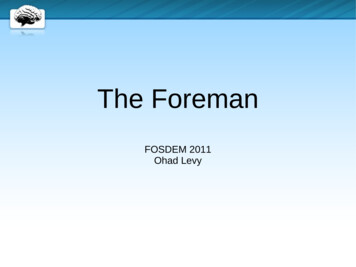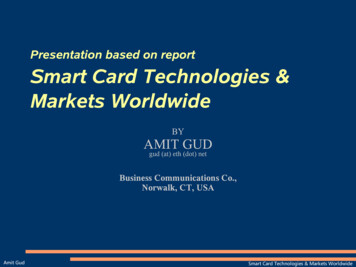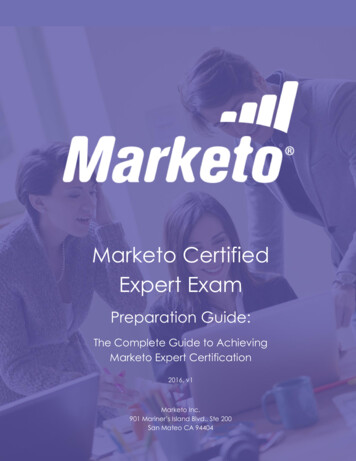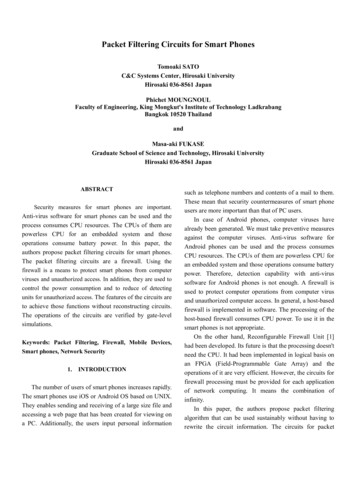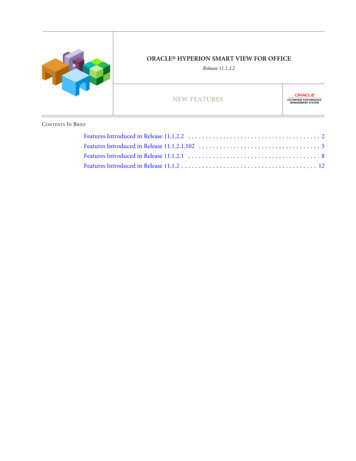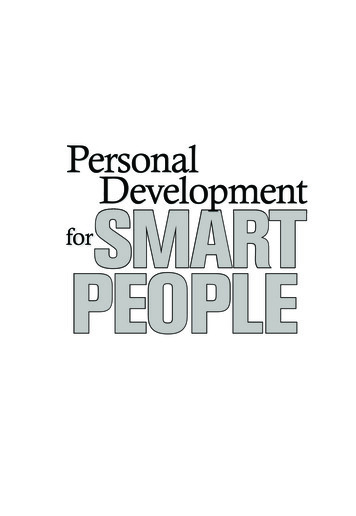
Transcription
PersonalDevelopmentSMARTPEOPLEforPersonal Dev. interior.indd 17/15/08 10:26:30 AM
Hay House Titles of Related InterestYOU CAN HEAL YOUR LIFE, the movie, starring Louise L. Hay & Friends(available as a 1-DVD program and an expanded 2-DVD set)Watch the trailer at: www.LouiseHayMovie.com ATTITUDE IS EVERYTHING FOR SUCCESS: Say It, Believe It, Receive It,by Keith D. HarrellTHE COMPASSIONATE SAMURAI: Being Extraordinary in an Ordinary World,by Brian KlemmerHOW SUCCESSFUL PEOPLE WIN, by Ben SteinINTERPERSONAL EDGE: Breakthrough Tools for Talking to Anyone,Anywhere, about Anything, by Daneen Skube, Ph.D.THE RICHES WITHIN: Your Seven Secret Treasures, by Dr. John F. DemartiniSECRETS OF SUCCESS: The Science and Spirit of Real Prosperity,by Sandra Anne Taylor and Sharon A. KlinglerSUCCESS INTELLIGENCE: Essential Lessons and Practices from the World’sLeading Coaching Program on Authentic Success, by Robert Holden, Ph.D.21 DISTINCTIONS OF WEALTH: Attract the Abundance You Desire,by Peggy McColl All of the above are available at your localbookstore, or may be ordered by visitingHay House USA: www.hayhouse.com Hay House Australia: www.hayhouse.com.auHay House UK: www.hayhouse.co.ukHay House South Africa: www.hayhouse.co.zaHay House India: www.hayhouse.co.in Personal Dev. interior.indd 27/15/08 10:26:31 AM
PersonalDevelopmentSMARTPEOPLE forThe Conscious Pursuit of Personal growthSTEVE PAVLINAHAY HOUSE, INC.Carlsbad, California New York CityLondon Sydney JohannesburgVancouver Hong Kong New DelhiPersonal Dev. interior.indd 37/15/08 10:26:31 AM
Copyright 2008 by Steve PavlinaPublished and distributed in the United States by: Hay House, Inc.: www.hayhouse.com Published and distributed in Australia by: Hay House Australia Pty. Ltd.: www.hayhouse.com.au Published and distributed in the United Kingdom by: Hay HouseUK, Ltd.: www.hayhouse.co.uk Published and distributed in the Republic of SouthAfrica by: Hay House SA (Pty), Ltd.: www.hayhouse.co.za Distributed in Canada by:Raincoast: www.raincoast.com Published in India by: Hay House Publishers India:www.hayhouse.co.inEditorial supervision: Jill Kramer Design: Tricia BreidenthalAll rights reserved. No part of this book may be reproduced by any mechanical,photographic, or electronic process, or in the form of a phonographic recording; normay it be stored in a retrieval system, transmitted, or otherwise be copied for publicor private use—other than for “fair use” as brief quotations embodied in articles andreviews—without prior written permission of the publisher.The author of this book does not dispense medical advice or prescribe the useof any technique as a form of treatment for physical, emotional, or medical problemswithout the advice of a physician, either directly or indirectly. The intent of the author isonly to offer information of a general nature to help you in your quest for emotional andspiritual well-being. In the event you use any of the information in this book for yourself,which is your constitutional right, the author and the publisher assume no responsibilityfor your actions.Library of Congress Cataloging-in-Publication DataPavlina, Steve.Personal development for smart people : the conscious pursuit of personal growth /Steve Pavlina. -- 1st ed.p. cm.ISBN 978-1-4019-2275-7 (hardcover : alk. paper) -- ISBN 978-1-4019-2276-4(tradepaper : alk. paper) 1. Self-actualization (Psychology) 2. Maturation(Psychology) I. Title.BF637.S4P385 2008158--dc222008021487Hardcover ISBN: 978-1-4019-2275-7Tradepaper ISBN: 978-1-4019-2276-411 10 09 08 4 3 2 11st edition, October 2008Printed in the United States of AmericaPersonal Dev. interior.indd 47/15/08 10:26:31 AM
For Erin.Thank you for teaching me how to love.Our souls are dancing.Personal Dev. interior.indd 57/15/08 10:26:32 AM
Personal Dev. interior.indd 67/15/08 10:26:32 AM
ContentsIntroduction.ixPART I: Fundamental PrinciplesChapter 1:Chapter 2:Chapter 3:Chapter 4:Chapter 5:Chapter 6:Chapter 7:Truth. 3Love. 27Power. 47Oneness. 69Authority. 85Courage. 101Intelligence. 115PART II: Practical ApplicationChapter 8:Chapter 9:Chapter 10:Chapter 11:Chapter 12:Chapter 13:Habits. 137Career. 161Money. 177Health. 199Relationships. 215Spirituality. 235Afterword. 253Resources. 255About the Author. 257Personal Dev. interior.indd 77/15/08 10:26:32 AM
Personal Dev. interior.indd 87/15/08 10:26:32 AM
Introduction“When I’m working on a problem, I never thinkabout beauty. I think only how to solve the problem.But when I have finished, if the solutionis not beautiful, I know it is wrong.”— R. B u c k m i n s t e r F u l l e r Do you remember the exact moment you first became interestedin personal development? I certainly do. It happened in January 1991while I was sitting in a jail cell. I’d just been arrested for felony grandtheft. This wasn’t my first run-in with the law, so I knew was in trouble.I was 19 years old.I began stealing shortly after moving to Berkeley, California, during my first semester at UC Berkeley. I didn’t steal for money or tobuild a reputation—I stole for the thrill. I was addicted to the surgeof adrenaline. The compulsion to steal was so strong that shopliftingwas part of my routine, nothing more than my daily espresso. Usually Ididn’t care what I stole; it was the act of stealing that seduced me. Ona typical outing, I’d lift a dozen candy bars and then drop them off ina public place, figuring that other people would eat them. I didn’t eatthe candy because I didn’t think it was healthy.As I sat in jail for several days that January with nothing to do butwallow in my own stupidity, the reality of my situation came crashingdown upon me. In high school I’d been a straight-A honors student,president of the math club, and captain of the Academic Decathlonteam. My future as a computer-science major looked unbelievablybright, but somehow I’d torn it to shreds. Now I was expecting tospend the next year or two behind bars.ixPersonal Dev. interior.indd 97/15/08 10:26:32 AM
Personal development for smart peopleUpon returning to my studio apartment after three days in jail, Ireceived a letter from UC Berkeley informing me in no uncertain termsthat I’d been expelled. Apparently schools do that sort of thing whenyou don’t bother showing up to classes and your grade point averagestarts with a decimal point. In that moment, I realized I had two basicoptions for how to deal with my situation: grow up or give up.During the next few months while waiting for my court date, Iwas in a total funk. Most days I slept until well past noon. I buried myself in video games, sometimes for 18 hours at a time. (We’re talkingsingle-player Nintendo games here, not massive multiplayer onlinegames.) It’s hard to feel motivated when you’re expecting to go to jailfor a while.Eventually I secured a lawyer and met with him at his office todiscuss my situation. Before I could open my mouth, he blurted out,“Steve, I’ve reviewed your case, and since this is your first offense,I’m pretty sure we can get it reduced to petty theft. If we plead nocontest, you’ll get off with a lesser conviction and end up with somecommunity service. I’m on great terms with the district attorney, soI’m sure he’ll go for it. I strongly advise against going to trial, as theevidence against you is overwhelming, seeing as you were caughtred-handed.”Immediately my thoughts began to race. First offense? Is he deluded? Why does he think this is my first offense? Doesn’t he know aboutmy priors? If he thinks this is a first offense, will the rest of the court thinkso, too? Should I correct him on this serious oversight?While trying to decide how to respond, I heard a voice in the backof my mind: Keep your damned mouth shut! I realized that speakingup now might backfire on me later, but there was a slim chance itcould “frontfire,” too. I figured that the worst case was that I’d havean angry lawyer somewhere down the road, but the best case was toogood to pass up. Grand theft is a felony; petty theft is only a misdemeanor. I decided I had to risk it. Taking risks was an all-too-familiarpastime.Several weeks later we went to court, and I was a nervous wreck.My plan was to keep my mouth shut as much as possible and onlysay the absolute minimum. Outside the courtroom, I reviewed thexPersonal Dev. interior.indd 107/15/08 10:26:32 AM
Introductionposted documents about my case. None of my priors were listed. Wasit human or computer error? Either way, it was one huge mistake inmy favor.Sure enough, when my lawyer and I entered the courtroom, thecourt remained under the assumption that this was a first offense anddiligently processed it as such. I pled no contest to the reduced chargeof petty theft and received 60 hours of community service. My headwas spinning as I raced out of the courtroom. The next two years ofmy life were mine again.I did those 60 hours like I was at a dream job, knowing full wellmy sentence could have been 17,520 hours. It’s hard to imagine amore joyful time in my life than those days spent picking up trash atthe Emeryville Marina. You have no idea how good freedom feels untilyou expect to lose it. I felt immensely grateful for this second chance,a chance I felt I didn’t deserve.I wish I could say my recovery after these events was fast andeasy, but it wasn’t. Despite this amazing gift, turning my life aroundwas still incredibly difficult. I said good-bye to my Berkeley friends andmoved back to my hometown of Los Angeles. I landed a minimumwage job in retail sales. Even with a criminal record, I probably couldhave found a more lucrative position, but I just didn’t want one. I onlywanted to play it safe, stay below the radar, and eke out a “vanilla” lifedevoid of stress and excitement. Courage had become my enemy.During this year of quiet, uneventful living, I worked on myself.I gradually developed a new code of ethics to guide me, integratingvalues such as honor, honesty, integrity, humility, and fairness. Thisconscious reconstruction process would continue for at least a fewmore years. As the months went by, I began to feel good about myselfagain, and I decided it was time to go back to school. I figured that ifI could earn my degree in computer science, it would somehow erasemy past mistakes.In the fall of 1992, I enrolled at California State University–Northridge (CSUN), starting over as a freshman. CSUN’s computerscience program wasn’t impacted, meaning that it had plenty of roomfor new students. I was guaranteed admittance just by filling out anapplication, so they didn’t care that I’d flunked out of UC Berkeley.xiPersonal Dev. interior.indd 117/15/08 10:26:32 AM
Personal development for smart peopleNow 21 years old, I was no longer the same person I’d been at 18.Something was different. I’d developed a passion for personal growth,and I felt an intense desire to do my absolute best this time.In my mind, I was already three years behind, and I couldn’t stomach the thought of taking four more years to graduate. I knew I wasresponsible for this situation, and I intensely desired to speed thingsalong. So I set the ambitious goal of earning my degree in only threesemesters by taking triple the normal course load. Those who knewme thought I’d gone insane, but they couldn’t see into my heart. Iwas 100 percent committed, and I knew that nothing could stop mefrom achieving this goal. It was the only way I could honor my tremendous gift of freedom.To prepare myself for the heavy workload, I studied timemanagement techniques and immediately applied what I learned. Ilistened to motivational tapes every day to keep my attitude positive. Iexercised daily to manage stress, and I found creative ways to increasemy productivity. I experienced a tremendous flow of energy and drivebecause I knew I was finally doing my best. I worked hard and acedmy classes. I even added a double major in mathematics along theway. At my graduation, I was given a special award for being the topcomputer-science student of the year.In my final semester, I also worked as a contract programmer,developing several computer games for a local games studio, and Iserved as vice chair of the school’s computer club. It took a lot ofhard work and conscious effort, but I successfully achieved my goalof graduating from college in three semesters. Somehow this achievement helped me release the pain and guilt of my past while retainingthe valuable lessons I’d learned.During the months after my graduation, I launched my own computer-game development business and began dating my future wife,but personal growth remained my top priority. Little did I know at thetime, my lifelong pursuit of conscious growth was only beginning.Over the next several years, I read hundreds of books and listened todozens of audio programs on a diverse selection of personal development topics, including psychology, motivation, success, productivity,career development, problem solving, health, wealth, conscious living, spirituality, meditation, and more.xiiPersonal Dev. interior.indd 127/15/08 10:26:32 AM
IntroductionAdmittedly, most of the self-help information I absorbed wasn’tvery helpful. The authors were enthusiastic, but their ideas were oftenunoriginal, inconsistent, incongruent, incomplete, impractical, or simply incorrect. I suspected that many of them exaggerated their results.If you’re an avid reader of such works, I’m sure you’ve encounteredsimilar problems, such as buying a diet book and discovering that it’snothing more than a disguised sales pitch for expensive supplements.Nevertheless, I did encounter some nuggets of wisdom that gave menew insights and helped me improve my life. However, my greatestbreakthroughs usually came from personal experimentation, not fromdevouring information products.I ran my computer-games business for many years (sometimessuccessfully, sometimes unsuccessfully) while maintaining a passionate interest in personal development on the side. But as time went by,I lost interest in game publishing, and running my business becameless fulfilling. I decided it was time to expand my personal development hobby into my primary career.Creating StevePavlina.comIn 2004, my wife and kids and I moved from Los Angeles to LasVegas, and in October of that year I officially retired from computergame publishing to launch a new online personal development business, StevePavlina.com. I started a blog, wrote articles, and recordedaudio programs to share what I’d learned from more than a decade ofpersonal-growth efforts. Within three years I’d created enough material to fill about 20 books, and I still felt as though I was just gettingstarted. I shared all of this content for free. The Website generatedincome from advertising, affiliate programs, promotional offers, anddonations.Although I had virtually no credibility in the personal development field when I began, StevePavlina.com exploded with traffic,quickly becoming the most popular personal development Websitein the world with readers in more than 150 countries. This happenedby word of mouth, since people who benefited from the free contentxiiiPersonal Dev. interior.indd 137/15/08 10:26:33 AM
Personal development for smart peopleoften referred their friends, family members, and co-workers to thesite. I never spent a dime on marketing or promotion. Soon the sitewas bringing in tens of thousands of dollars a month, even though Ihad no products, no employees, and no customers. This drew evenmore visitors, since people wanted to know how I could be earning somuch money by giving everything away for free. All of this free content is still available on the site today, with more being added everymonth.Running StevePavlina.com massively advanced my personalgrowth knowledge because I had the opportunity to communicatewith so many people about their unique challenges. After thousands ofinteractions with my readers, I began to detect recurring patterns andthemes. I also noticed that when I wrote an article on a specific subject,often someone would take a general concept from the piece and find away to apply it to a totally different area. For example, if I wrote aboutsleep, someone would figure out how the same general advice couldbe applied to their business. I began to suspect that there was a hiddenorder beneath our seemingly chaotic growth experiences.What Is Personal Development for Smart People?Personal development for smart people is a phrase I use to describemy approach to personal growth. Instead of going after the lowhanging fruit and solving the easy problems, such as how to makehealthier food choices or earn more money, I wanted to answer a reallytough question: what does it mean for us to grow as conscious humanbeings, and how do we intelligently guide that process?There were two threads in my life that led me to tackle this question. The first thread was my long-term fascination with the conceptof intelligence. The second thread was my direct study of the field ofpersonal development.While earning my computer-science degree, I specialized in artificial intelligence (AI). I learned how difficult it is to create intelligent computer programs, largely because we don’t really understandintelligence. I incorporated basic AI techniques in some of my earlyxivPersonal Dev. interior.indd 147/15/08 10:26:33 AM
Introductioncomputer games, but those programs only mimicked intelligent behavior and couldn’t be considered truly intelligent. I soon asked myself: How do I actually know that I’m intelligent? I couldn’t find an answer that satisfied me. Eventually my pursuit of personal developmentled me to adopt a new definition of intelligence that satisfied both mylogic and intuition. You’ll learn that definition in Chapter 7.While studying personal development for many years, I learned thatthis field is very broad and fragmented. Any area of your life can reasonably slide under the umbrella of self-improvement, including yourhealth, career, finances, relationships, and spiritual beliefs. Each subsetof this field has its own purported experts, all of them sharing differentideas, rules, and advice. Relationship experts tell you how to maintainsuccessful relationships, wealth experts teach you how to manage yourmoney, and health experts help you improve your body.Unfortunately, these experts often disagree with each other. Somepeople recommend a high-protein diet; others recommend high carb.Some say you can achieve success through hard work and self-discipline; others advise letting go and allowing God or the universe tohandle the details. Some experts encourage you to change; otherssay you should accept yourself as you are. If you try to incorporate allthese different ideas into your life, you’ll end up with a fragmented,incongruent mess.I soon realized that an intelligent approach to personal development would have to resolve these incongruencies somehow. Such anapproach would have to make logical and intuitive sense, satisfyingboth head and heart. It would have to appear logically correct in orderto satisfy the left brain, and it would have to feel intuitively correct inorder to engage the right brain.Qualities of the Core PrinciplesThe laws of physics are universal. Although their specific applications can vary tremendously, these governing laws don’t changebased on our location, our culture, or our moods; the core principlesare the same whether we’re dealing with rockets or submarines. WhyxvPersonal Dev. interior.indd 157/15/08 10:26:33 AM
Personal development for smart peopleshould the field of personal development be any different? Couldn’tuniversal laws of consciousness exist as well?I decided to tackle this problem head-on, doing something I’venever seen done before. I set out to find the common pattern behind all successful growth efforts, to identify a complete set of coreprinciples that would be universally applicable. To define what thisset of principles would have to look like, I outlined several criteria, allof which would have to be satisfied by the final solution. These criteria include universality, completeness, irreducibility, congruency, andpracticality:First, these principles must be universal. They must be applicableby anyone, anywhere, in any situation. They must work equally wellfor all areas of life: health, relationships, career, spiritual growth, andso on. They must be timeless, meaning that they can still be expectedto work 1,000 years from now, and they would have worked 1,000years ago. They must be culturally independent. They need to workfor all those living on Earth, as well as for people aboard a space station in orbit. They must work both individually and collectively, sothey’re effective for any group of any size.Second, these principles must be collectively complete, so all thecritical elements are present and none are missing. It should be possible to trace all other effective universal laws of personal growth backto these basic building blocks. Ideally, these principles should lendthemselves to a structure that is both simple and elegant.Third, the primary principles must be irreducible, similar to primenumbers in mathematics. They must serve as the fundamental atomicbuilding blocks of conscious human growth. Therefore, it must bepossible to combine two or more primary principles together to formsecondary principles, and the resulting combinations must also be inherently sound and universally applicable.Fourth, these principles must be internally congruent. They can’tbe in conflict with each other. They must be logically and intuitivelyconsistent.Finally, these principles must be practical. They must be ableto generate intelligent real-world results. You should be able to usethese ideas to diagnose personal development challenges and devisexviPersonal Dev. interior.indd 167/15/08 10:26:33 AM
Introductionworkable solutions. Knowledge of them should accelerate your personal growth, not obfuscate it.Consider the statement “Love your neighbor as yourself.” Thisconcept can and does assist many people on their path of personalgrowth, but unfortunately it violates most of our criteria, so we can’tinclude it as part of our framework. First, the concept isn’t universal.It applies well to some areas of life such as relationships and evenbusiness, but it doesn’t make as much sense if we try to apply it toimprove our physical health. Second, it isn’t irreducible. This statement actually derives from the more general principle of oneness, andoneness itself can be derived from the principles of truth and love (seeChapter 4). Taken in isolation, this statement is incomplete, so it onlyprovides partial guidance. “Love your neighbor as yourself” is soundadvice that may help you improve your interpersonal relationships,but it probably won’t help you pay your bills. There are many similarconcepts that have positive applications but that we can’t include aspart of our underlying framework because they don’t satisfy all of ourcriteria.Finding the hidden order behind all conscious human development is extremely difficult because the solution has to be fairly generaland abstract, but it must also have abundant practical applications.Because we’re dealing with the realm of pure conscious thought, thesolution won’t be as crisp as a mathematical formula, but it shouldbring us as close to that ideal as we can reasonably get.I researched various philosophical, psychological, and spiritualframeworks that had previously attempted to address this challenge.Some had clearly identified one or more of the core concepts, butnone provided satisfactory explanations of the big picture. I rackedmy brain again and again, asking repeatedly: What is the underlyingpattern? There were clues everywhere, but the complete structure remained a mystery. The task seemed nearly impossible, and I had noguarantee there even was an answer. I ended up rejecting an almostendless progression of partial solutions. It was frustrating to find a solution that looked good at first glance, only to discover that it was fullof holes.xviiPersonal Dev. interior.indd 177/15/08 10:26:33 AM
Personal development for smart peopleIntroducing the Seven PrinciplesIt took me almost two and a half years, but I eventually found thesolution I was looking for. It consists of just three core principles: truth,love, and power. Four secondary principles are directly derived fromthe first three: oneness, authority, courage, and intelligence. Onenessis truth plus love. Authority is truth plus power. Courage is love pluspower. And intelligence is the total combination of truth, love, andpower. Consequently, we can say that the intelligent, “smart people”approach to personal development is the direction that moves youinto greater alignment with truth, love, and power. As you’ll learn inChapter 7, this also provides us with a very elegant definition of intelligence: Intelligence is alignment with the principles of truth, love, andpower.Don’t worry if you don’t understand these principles yet. We’llspend a full chapter exploring each one, and several additional chapters will address their practical applications. Once you learn theseseven principles and recognize how they operate in all areas of yourlife, you’ll never look at personal development the same way again.Some of these principles will appear to be common sense at firstglance. The principle of truth is intuitively understood by any scientist. The principle of love is common to all major religions. And theprinciple of power shows up repeatedly in business and government.Unfortunately, our society tends to compartmentalize these principles. We’re taught to favor truth during our early education, whileour power is simultaneously weakened by external authority figures.We’re encouraged to align with love in our relationships and spiritual practices while truth and power are de-emphasized. And we’reconditioned to seek power as we build our careers and improve ourfinances, while truth and love take a backseat in these areas. This is anenormous mistake. These principles are universal; they cannot be successfully compartmentalized without sacrificing something far moreimportant—our true nature as conscious beings.The goal of this book is to teach you how to bring all areas of yourlife into alignment with these universal principles. This requires injecting truth into your relationships, aligning your career with love, andxviiiPersonal Dev. interior.indd 187/15/08 10:26:33 AM
Introductionbringing power to your spiritual practice. This is what it means to liveas a conscious, intelligent human being. The more your life aligns withthese principles, the smarter you become.This book offers you a new way of thinking about personal growthfrom high-level concepts to practical actions. You won’t need differentrules for maintaining your health, building your career, and caring foryour relationships. The core principles of growth don’t change fromone area of life to the next, nor do they vary from person to person.Once you understand how they work, you’ll be able to use them toimprove your results in any endeavor.How to Read This BookThis book is organized in two parts. Part I explores the seven fundamental principles of personal development, starting with the threeprimary principles of truth, love, and power. By internalizing thesebasics, you’ll build a solid foundation for improving your growth efforts in all areas of your life. Your goal for reading this part of the bookis simply to gain an understanding of these seven principles. There aresome suggested application exercises to deepen your understanding,but you don’t need to do them on your first pass. Those exercises aremainly intended to illustrate how the ideas can be applied throughaction. Because some of these principles build on those before them,it’s best to read these first seven chapters in order.Part II is the down and dirty application section. This half of thebook explains how to apply the seven principles to generate positive,practical results in your life. Every chapter tackles a different area oflife, including your career, health, relationships, and more. You canread these chapters in any order, so feel free to jump straight to thesection that interests you most. However, it’s best if you read all thechapters in Part I before progressing to Part II.This is a very content-rich book, packed with fresh ideas. Take asmuch time as you need to read it, and don’t feel you have to race tothe end. This book is meant to serve you in your pursuit of personalgrowth, and how that plays out is up to you.xixPersonal Dev. interior.indd 197/15/08 10:26:33 AM
Personal development for smart peopleIf you want extra help or if you’d just like to explore personaldevelopment with like-minded fol
in personal development? I certainly do. It happened in January 1991 while I was sitting in a jail cell. I’d just been arrested for felony grand theft. This wasn’t my first run-in with the law, so I knew was in trouble. I was 19 years old. I began stealing shortly after moving to Berkel
